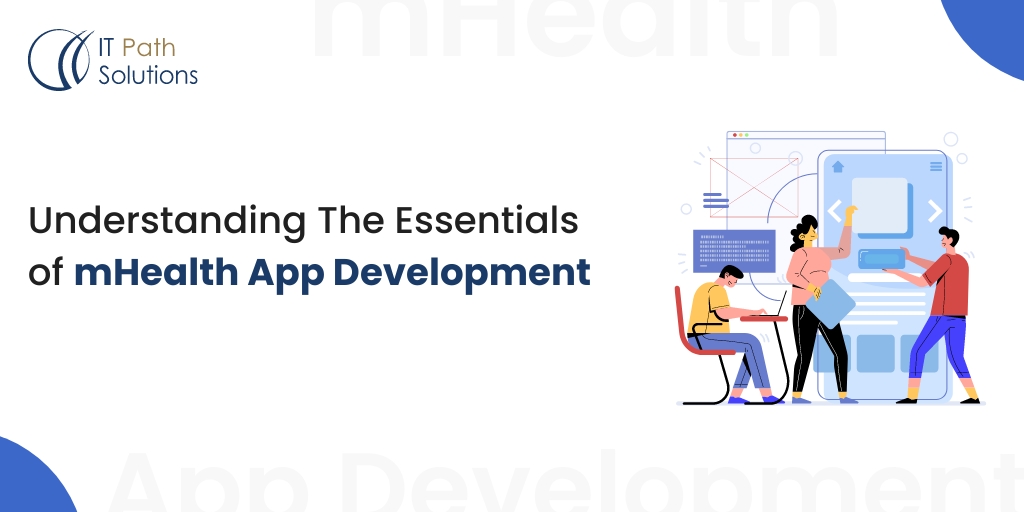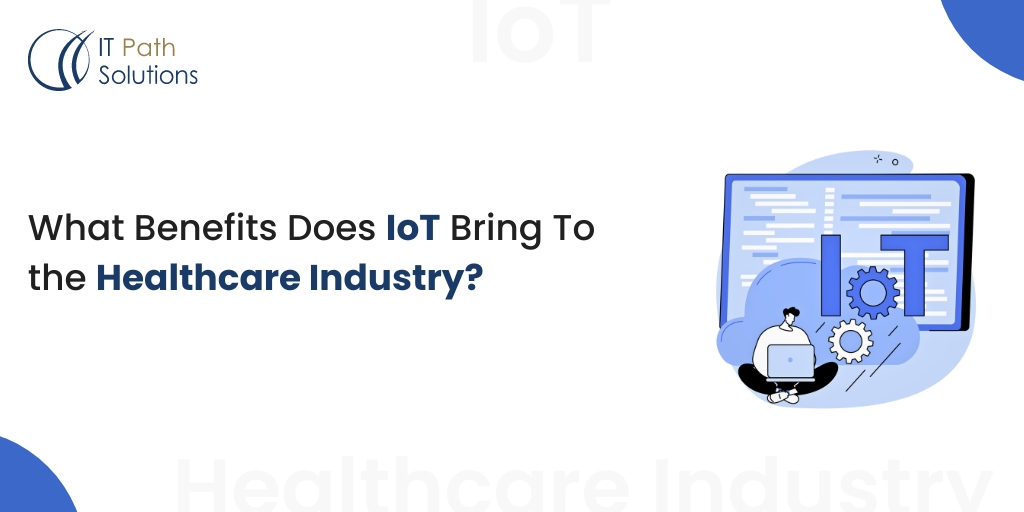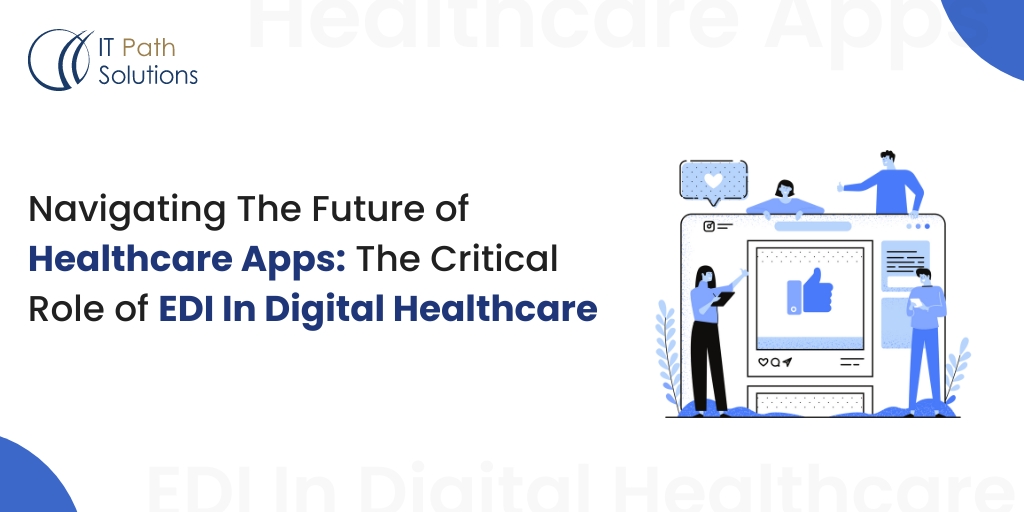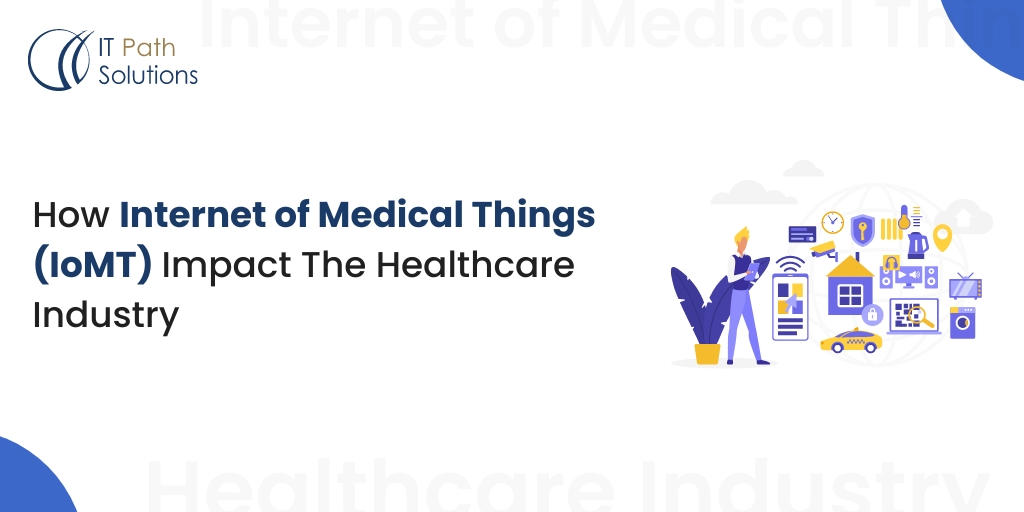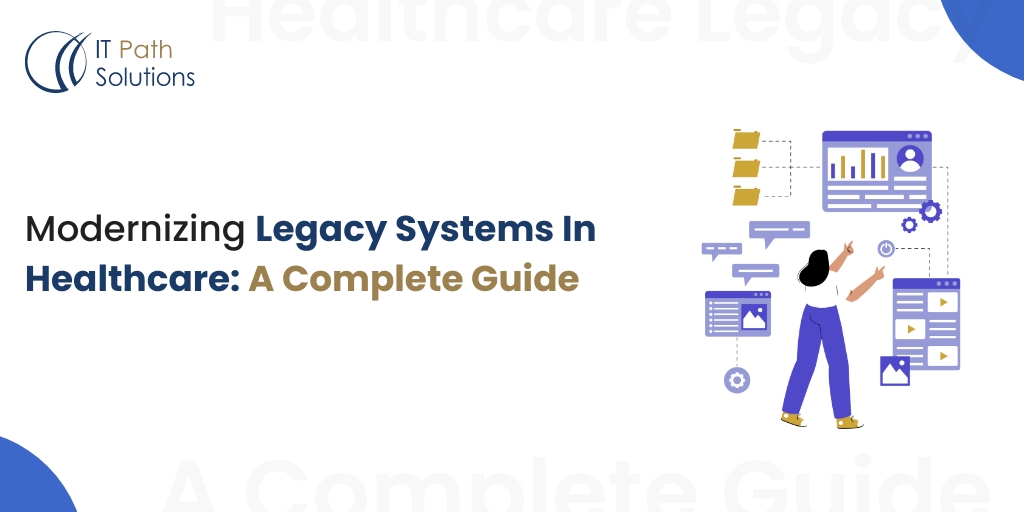How To Transform Patient Care with Innovative Healthcare Mobility Solutions
Healthcare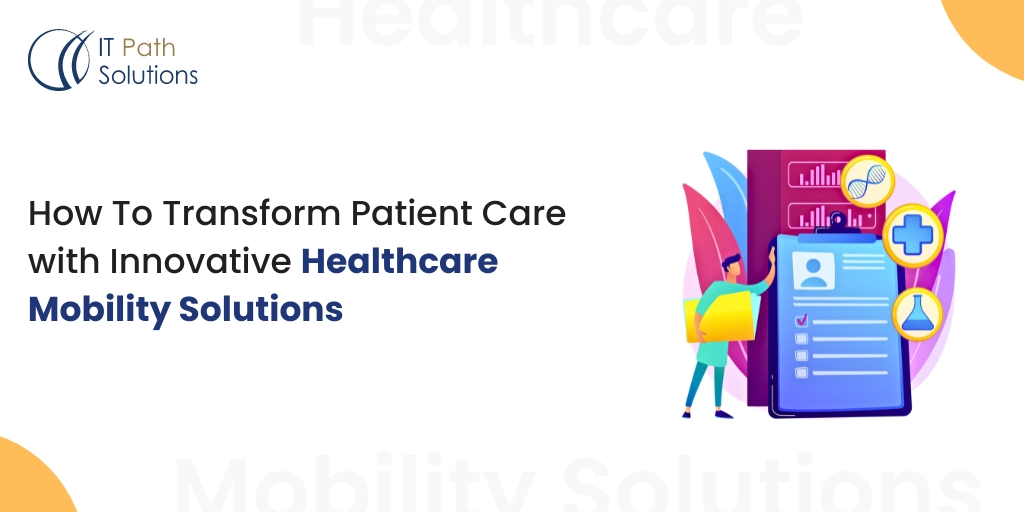
Modern healthcare industry is in a process of a change due to the integration of mobility solutions and healthcare software development. The global healthcare mobility market is poised to reach a value of $355 Billion in 2029. Transformation is assisting healthcare facilities to produce improved health results in its patients.
Clinical Mobility Solutions has always been one of the strategic focuses of IT Path Solutions as a top healthcare software development company, as it has a major impact on the improvement of patient care and general satisfaction of the patients of various types of healthcare facilities.
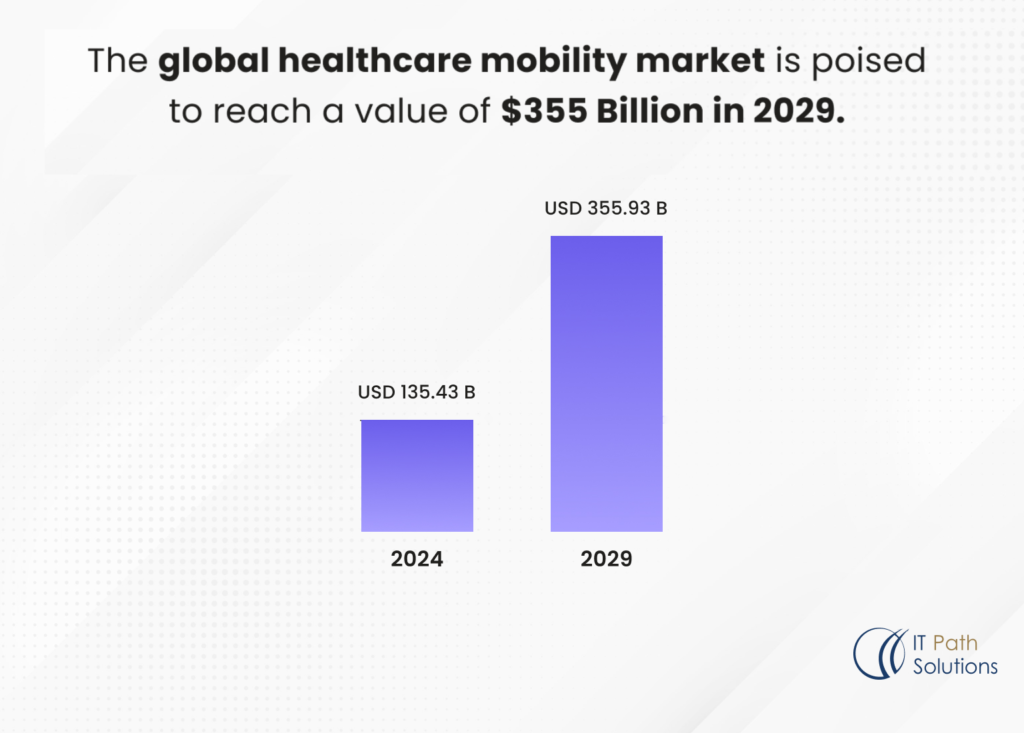
The Significance of Healthcare Mobility in the Modern Digital Era
Today’s healthcare mobility solutions development industry is experiencing a revolutionary change because of the integration of mobility solutions and healthcare software development being integrated together. The transformation is assisting healthcare facilities in the development of better health results for its patients.
Being one of the most reputable healthcare software development companies, IT Path Solutions has always paid much attention to the importance of Clinical Mobility Solutions as the key factor that can contribute to the improvement of the quality of the services delivered to the patients and the overall experience of the healthcare facilities of any types and sizes.
The dynamics of the healthcare mobility solutions development care has shifted over the years and the patient care demands easy access, convenient and tailor made care because of the facility and the available options occasioned by advancement in digital technology in the health care sector. The patient is not willing to just report to a health facility with the intention of standing in a queue for someone to attend him or her. In this regard, the most important is the software development that helps to create the healthcare mobility solutions that are based on both, hardware and software and allow users to use the underlying hardware conveniently.
When it comes to the integration of contemporary technologies and sophisticated software applications, healthcare providers can go beyond typical limitations and provide high-quality patient-oriented care.
With the help of Mobile devices, Wearables technologies and Digital health solutions, patients and health care practitioners have been able to design a new Patient engagement and experience paradigm for all the stakeholders involved. Not only are we digitizing healthcare, but we are changing healthcare itself with digitized healthcare. As mentioned earlier, Healthcare mobility solutions have the capability to revolutionalise the way care is delivered, supervised and coordinated, allowing real-time access to patients’ records, remote monitoring and consultation. All of this is now a reality.
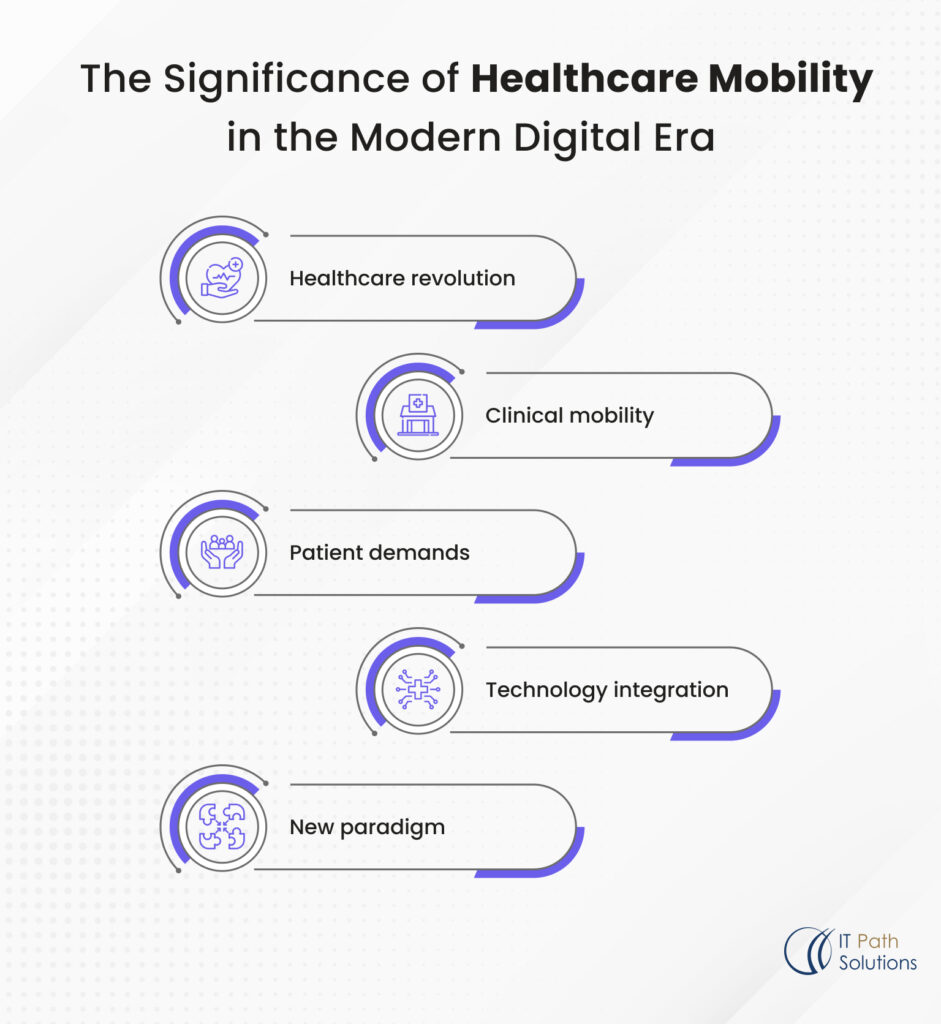
The Evolution of Healthcare Mobility
This transformation process from conventional healthcare that is not very reliant on digital technology to mobile-oriented patient care has been incredible. Previously, which was not very long, healthcare was more or less restricted to buildings and patients had to go to clinics or hospitals for checkups or treatment whenever they got sick or when there was a sick member in the family.
Nevertheless, the use of mobile devices and wearable technologies has interfered with this method or type of patient care and has instead allowed patients to be cared for at any place and at any time. This was of great help during covid as people had to stay inside their homes.
This journey of updating the healthcare systems has been made possible by the use of mHealth Applications, Mobile Healthcare Solutions & Healthcare App Development. This has made it easy for patients to monitor their health status, retrieve their medical records, make appointments and communicate with their physicians through mobile phones or PCs via healthcare mobile apps and platforms.
To that, the incorporation of wearable gadgets like the fitness trackers and remote monitoring devices has also transformed the manner in which patients’ data is collected and used by the care providers. These devices help the healthcare givers to get an understanding of the health status of a patient and therefore be in a position to attend to the specific needs of the patient from time to time as they may be required.
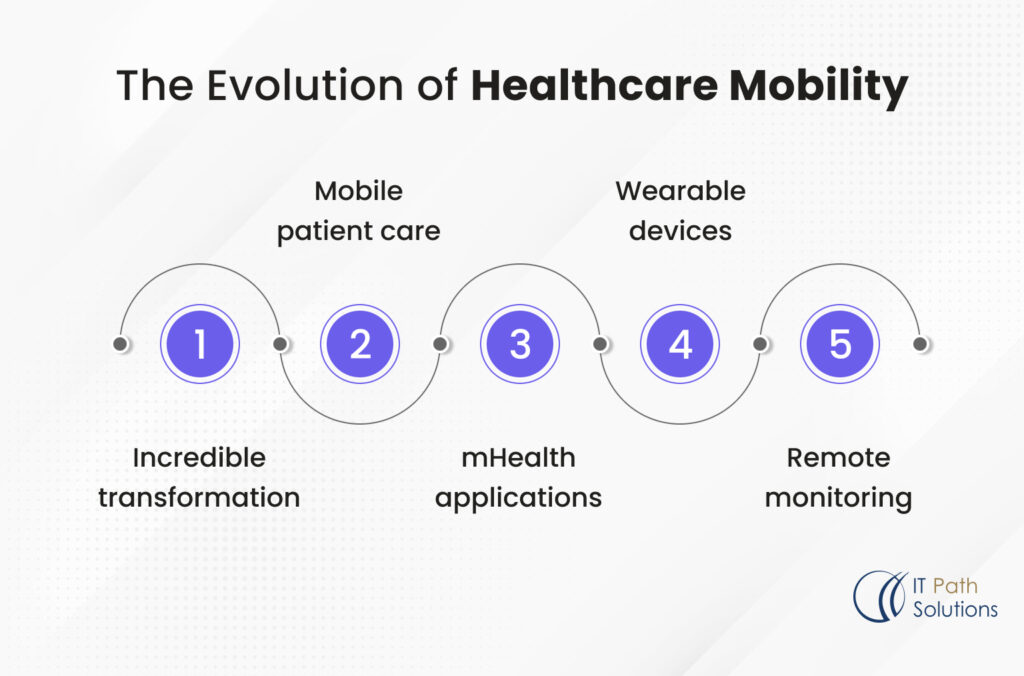
The Impact of Healthcare Mobility on Patient Engagement and Experience
The use of healthcare mobility solutions has dramatically affected patient communication and satisfaction. Doctors and nurses are no longer the only ones who are receivers of patients at a physical health facility; patients are, in a way, the active drivers of their own health to a state of holistic health. Mobile medical applications & wearable health applications are the tools that allow patients to take charge of the treatment and enhance the quality of their life.
In addition, telemedicine and virtual consultations have become common means of working and consulting with patients. The patient can be seen from the comfort of their home hence no long distances to be covered and no exposure to contagious diseases such as Covid or any other sickness to the patient or care giver when they have to transport the immobile patient. It also increases the utilization of the services offered by health facilities not only by the patients but also patients from distant or hard-to-reach regions.
The Software Development Backbone
Therefore, the most significant aspect of the effective implementation of healthcare mobility solutions is the strong and elastic software platform. At IT Path Solutions we are fully aware of the significance of utilizing advanced technologies like; Artificial Intelligence (AI), Internet of Things (IoT) and blockchain to develop Clinical Mobility Solutions.
With the help of AI and machine learning it is possible to introduce such functions for clinical mobility solutions such as predictive analysis and clinical decision support in healthcare software, which will help the healthcare professionals in making the right diagnosis and individual treatment plans. IoT on the other hand allows for easy connection of wearable devices and remote monitoring systems to improve the real time data acquisition.
Blockchain technology provides an efficient and secure method of storing and exchanging health information without violating the patient’s privacy and rights. IT Path Solutions is in the vanguard of using these technologies to create exceptional Enterprise Mobility in Healthcare solutions that are good for patients and caregivers and offers choices regarding the features and functionality of the applications for Clinical Mobility Solutions.
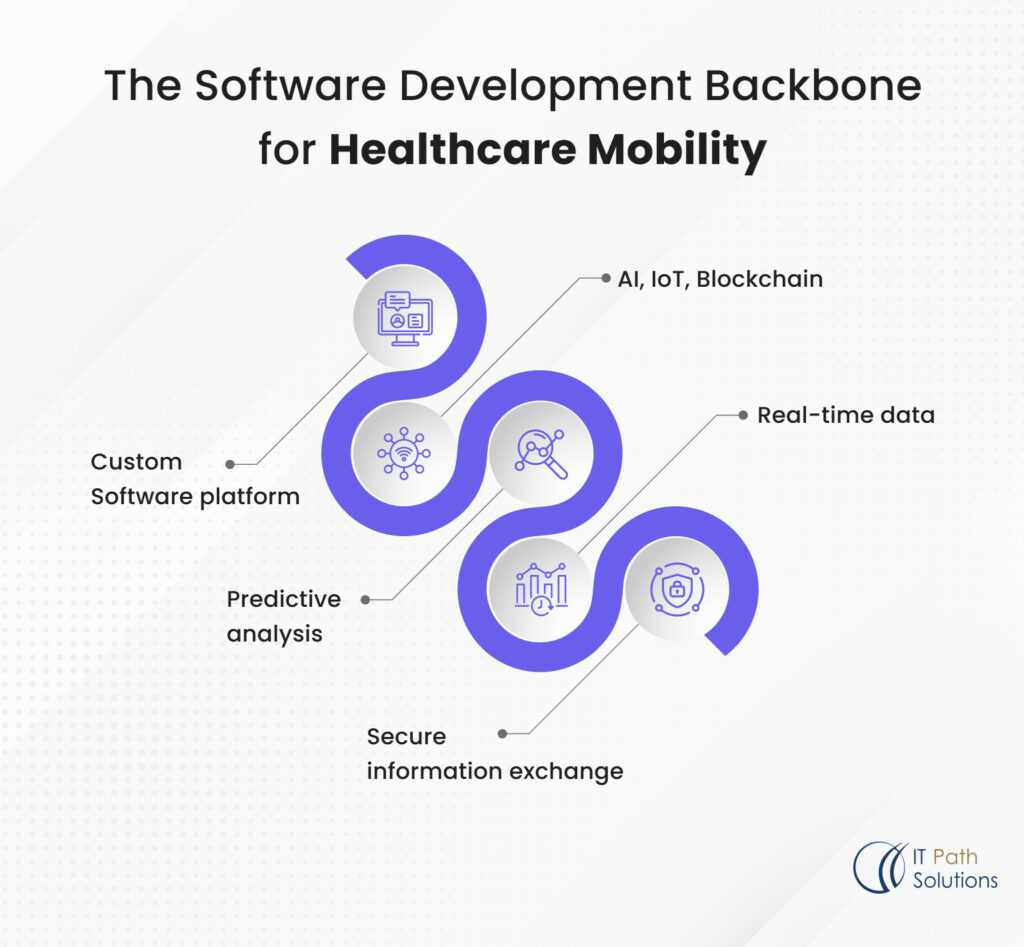
Overcoming Challenges: Security, Compliance, and Interoperability
Despite the various advantages that have been associated with healthcare mobility solutions, this concept entails several challenges to all the stakeholders. Security of data and confidentiality of the patient is THE major issue since healthcare data is very sensitive and has legal requirements that are very strict in nature like the HIPAA compliances. Any violation will lead to the closure of your app or website and several lawsuits from patients and the government. Therefore, one has to be always in a position to fully comply with these regulations.
Moreover, compatibility of the various health care systems and devices is important in order to be able to integrate the data between the various systems. You have to adopt the industry standards and practices to design Healthcare IT Solutions which can be easily implemented in the existing framework of healthcare facilities to effectively share information and work in collaboration with the healthcare professionals.
Revolutionizing Patient Care through Healthcare Mobility Solutions
Healthcare mobility solutions help health care providers by giving them real time information about the patients and capability to monitor all the patients with a single touch of the button. In light of the integration and interoperability of mobile devices and wearable technologies, healthcare practitioners can review a patient’s history, test results, and physical status in real-time, which allows them to make prompt decisions and interventions.
Telemedicine and virtual consultations have become hallmarks of the contemporary society because they allow patients to receive treatments at their convenience. This helps patients to be able to talk to their healthcare provider via video calls hence minimizing face to face contact and can also help in increasing the availability of specialty care in areas that might not have it. It is particularly beneficial for those who do not reside in large urban areas or their nearby hospitals.
Additionally, the mobile medical applications and wearable health applications are revolutionizing how the patient is managing his/her health and well-being in general. These apps provide features such as medication alarms, tracking symptoms, and even customized health coaching, thus enabling patients to embrace a new role and become active partners in the journey towards a state of optimized health.
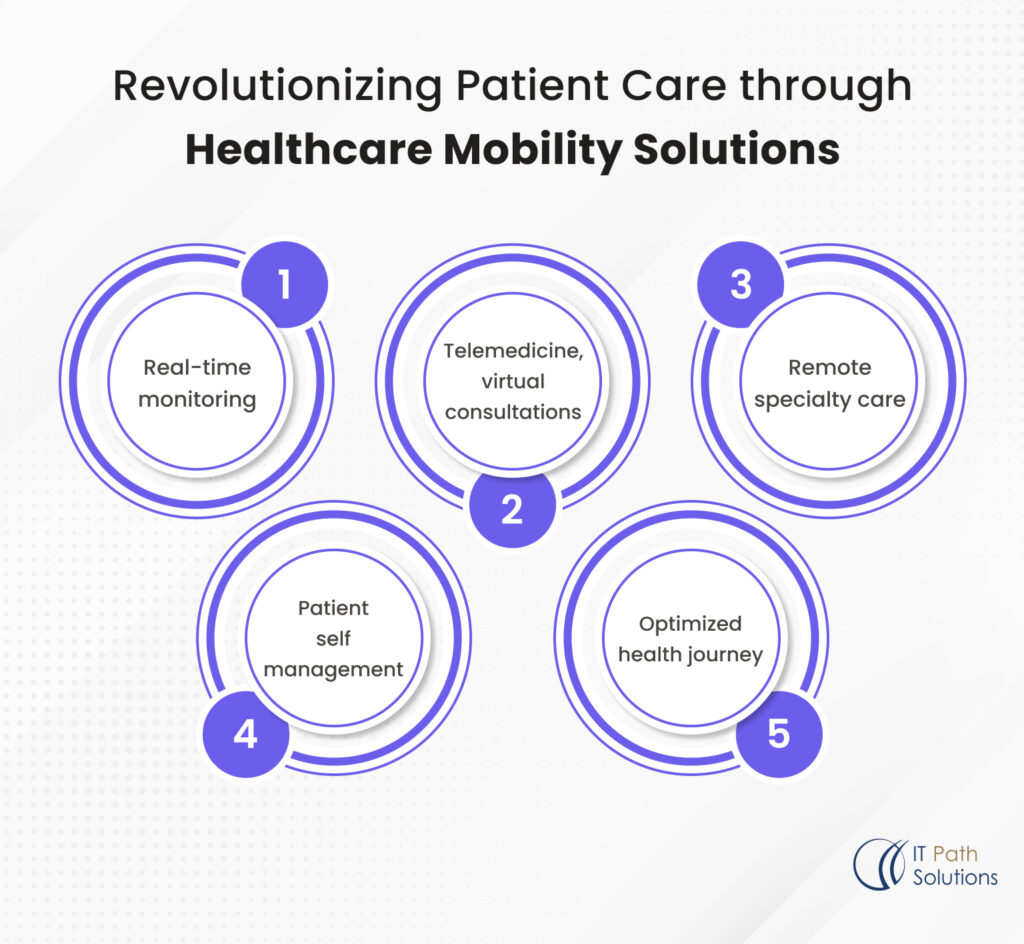
Streamlining Healthcare Workflows and Data Management
Mobile device management and HIPAA compliance are two essential components of mobile technology in healthcare.
A custom patient management software is designed to handle all the patient care related activities such as appointment scheduling, EHRs, and billing. Patients’ information can be retrieved and modified at a single place, and the healthcare providers can also communicate with the patients.
In addition, the specific Medical Practice Management Software that is developed for the specific medical practice eliminates the need for appointment scheduling, billing, and claims processing among other tasks that will be minimizing the workload that is placed on the shoulders of the healthcare providers and thus allowing them to focus on delivering quality services.
Custom Clinical Decision Support Systems use analytics and artificial intelligence to present information to the healthcare professionals and to assist them in decision-making process. These systems can discover patterns in large amounts of patient data to detect possible risks and recommend the right prevention and treatment measures and aid clinical decision making for the clinicians.
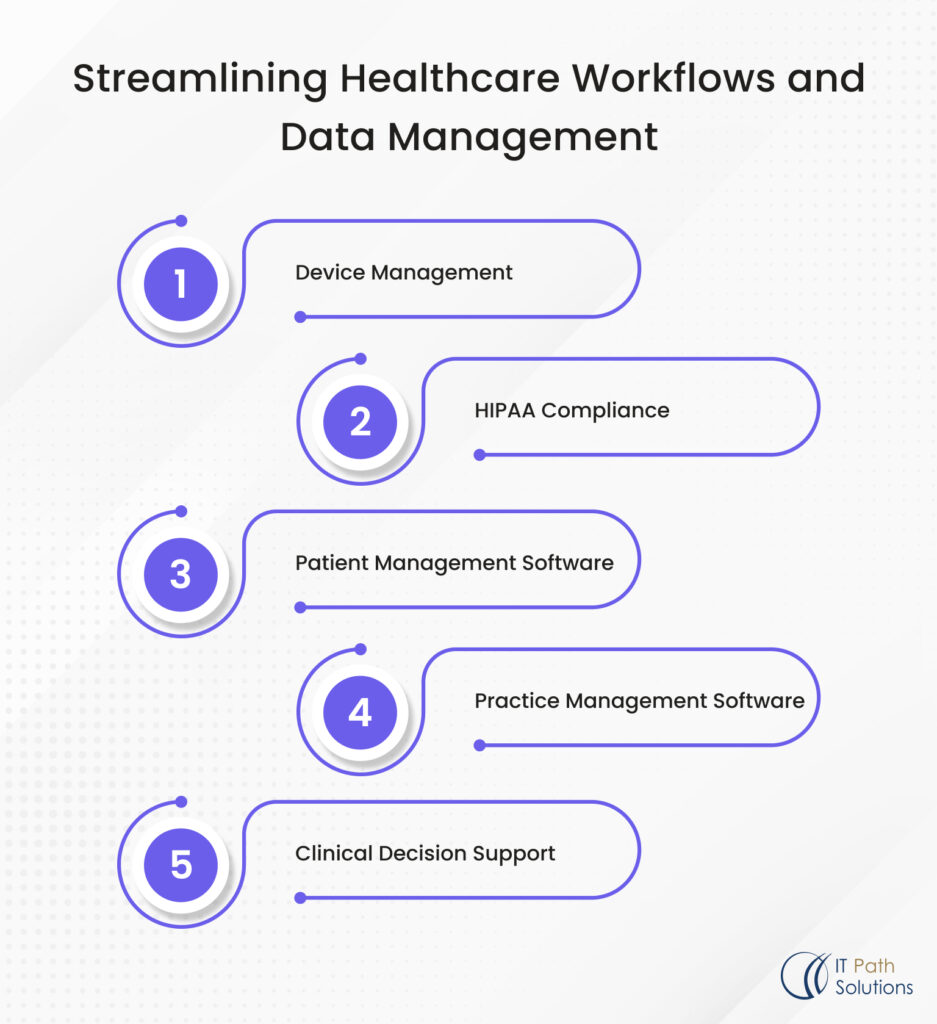
The Future of Healthcare Mobility: Embracing Innovation
The future of healthcare is about us accepting change and using mobile healthcare and the opportunities that it presents & Electronic patient records, or EMR EHR & digitizing healthcare is a path to better and more effective processes and the minimization of the risk of mistakes along with enhancing the availability of data for everyone. If we are to minimize these errors and organize and centralize the data, the impact on the patient’s result will be a lot.
HCITs enhance the exchange of information and communication in healthcare through real-time information sharing and coordination among the healthcare teams, thus promoting continuity of care. Think for a moment all the doctors and nurses and all the health care givers are in real time synchronization and sharing of information. These platforms allow the health care providers to share the patient information, consult about the patient’s treatment and plan the care co-ordination between various departments and health care institutions.
Also, the modernization of legacy systems and healthcare IT solutions are important to achieve interoperability among the elements of the healthcare environment. At IT Path Solutions, we focus on the healthcare domain and our area of expertise entails the integration of healthcare systems with advanced technologies and also the proper interoperability between systems and devices.
Patient-Centric Healthcare: The Ultimate Goal
Our innovative, user-focused mhealth apps, mobile health care solutions and medical app development services are geared towards placing your patients at the heart of healthcare provision. We enable them to actively manage their conditions by offering personalized health coaching, smooth communication with doctors and easy access to personal medical records.
Moreover, our patient-oriented health care systems strive to increase treatment success rates by bettering compliance with therapy programs and providing for early intervention and prevention. Our customized services use updated technology and informative data to build individualized treatments for each patient in a holistic manner.
FAQ
- What technologies are used in developing healthcare mobility solutions?
- Common technologies used include mobile app development frameworks (e.g., React Native, Flutter), cloud computing, Internet of Things (IoT), artificial intelligence (AI), machine learning, and blockchain. The choice depends on the specific requirements and features of the solution.
- How do you ensure compliance with healthcare regulations like HIPAA, GDPR, and HITECH during development?
- We follow a strict compliance-focused development process, including secure data handling, encryption, access controls, audit trails, and adherence to regulatory guidelines. Our developers are trained in healthcare compliance, and we incorporate best practices like OWASP for security.
- What is the typical process for developing custom healthcare mobility solutions?
- The process typically involves project analysis and requirements gathering, design and prototyping, development and testing, integration with existing systems (if applicable), compliance checks, deployment, and ongoing maintenance and support.
- How do you integrate healthcare mobility solutions with existing legacy systems and electronic health records (EHRs)?
- We leverage API integration and follow industry standards like HL7 and FHIR for seamless integration with legacy systems and EHRs. Our developers have experience working with various healthcare data formats and protocols.
- How do you ensure the scalability and performance of healthcare mobility solutions?
- We follow best practices for scalable and high-performance application development, including cloud computing, load balancing, caching, and optimized data handling. We also conduct thorough performance testing and monitoring to identify and address any bottlenecks.
- What measures do you take to ensure the security and privacy of sensitive healthcare data in mobility solutions?
- We implement robust security measures like data encryption (at rest and in transit), access controls, secure authentication, and auditing. We also follow secure coding practices, conduct regular security testing, and adhere to industry standards like OWASP.
- How do you handle updates and maintenance for healthcare mobility solutions after deployment?
- We offer ongoing maintenance and support services, including regular updates, bug fixes, security patches, and feature enhancements. We follow an agile development approach to ensure timely and efficient updates.
- Can you provide examples of successful healthcare mobility solutions you have developed?
- Sure, some examples include a telemedicine app for remote patient monitoring, a mobile EHR solution for streamlining clinical workflows, a medication management app for patients, and a wearable device integration platform for fitness tracking.
 Healthcare
Healthcare  Education
Education  Real Estate
Real Estate  Logistic
Logistic  Fitness
Fitness  Tourism
Tourism  Travel
Travel  Banking
Banking  Media
Media  E-commerce
E-commerce 

